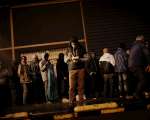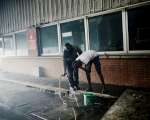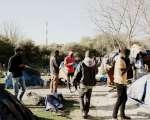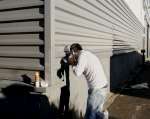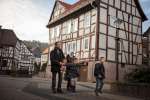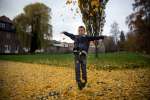First asylum-seekers relocate from Greece to Luxembourg
News Stories, 4 November 2015
ATHENS, Greece, Nov 4 (UNHCR) – It was the crack of dawn when 30 asylum-seekers from Syria and Iraq gathered around the departure gate at Athens International Airport on Wednesday, bound for a new life in a new land.
The atmosphere was full of expectation. Some could barely contain their excitement, others were more reserved. The children were sleepy but calm and smiling. Amid hugs and goodbyes, last photos were taken and the refugees walked through the gate to leave years of war and hardship behind.
"My family and I were lucky to survive the death trip on a boat from Turkey to Lesvos," said a Syrian father as he tightly gripped his family's boarding passes. He was referring to the dangerous voyage aboard smuggler boats from Turkey to the Greek islands that more than 600,000 people have made so far this year, and which has claimed more than 200 lives. "Now we are getting ready for our trip towards hope."
The group, including six families with a total of 19 children, were the first to be relocated from Greece to Luxembourg under a European Union programme that expects eventually to see the transfer of at least 160,000 people from Greece and Italy to participating EU countries.
This first departure from Greece was a cooperative effort led by national authorities in Greece and Luxembourg, with suport from European agencies, international organizations that included UNHCR, and other partners.
"The relocation scheme, even if modest compared with the needs, is an important first step towards a comprehensive approach for the management of refugee flows into Europe based on the principles of solidarity and responsibility-sharing," said Vincent Cochetel, UNHCR's Europe Bureau Director.
"Hopefully, this first relocation from Greece will mark the beginning of more refugee transfers within the EU in an organized, safe and orderly manner," he added.
A day before their departure, all of the families taking part in the first relocation expressed relief at finally reaching safety and seeing new hope for the future. They spoke with UNHCR at a temporary accommodation site in Elaionas, Athens.
"After all that my family and I went through, this is the first time I have felt calm and hopeful about the future," said a Syrian father of three. "I want my children to receive a good education. They are all so bright and both my wife and I were so sad they were not able to go to school for the last four years. I also feel lucky we did not have to make the dangerous and long trip through the Balkans."
UNHCR has repeatedly called on European countries to open more legal channels for refugees so they do not have to resort to smugglers and traffickers. Those channels include more family reunification and resettlement opportunities, including from countries of first asylum; humanitarian entry schemes and expanded visa arrangements for students and workers.
It will take time for the refugee families going to Luxembourg to get over the nightmare they have just endured.
"Actually, we did not have a life there," said a Syrian mother of five. "You would have either to kill or to be killed. Human life is worthless there. My children still cannot forget the sound of bombs. They wake up during the night, they only have images of war before their eyes."
Asked what she wanted for her children's future, she replied: "The same as all mothers -- I want to see them grow up in peace and love."
The group left Athens at 8:30am on a flight to Brussels, and then from there by bus to Luxembourg. They will be temporarily accommodated in a reception centre for the necessary needs-assessment and the provision of basic services. After a couple of days, they will be transferred to a more permanent residence for asylum applicants until a decision is made on their claim.
"We wish these refugees all the best in their new life and we hope that more asylum-seekers will similarly have a chance to find a place to call home without facing the dangers of secondary movements," UNHCR's Cochetel said. "At the same time, we must remember that for the relocation programme to work, proper reception capacity and registration of all arrivals will need to be put in place."
Present at the airport to say farewell to the refugees were Greek Prime Minister Alexis Tsipras; European Parliament President Martin Schulz; Luxembourg Minister of Foreign Affairs Jan Asselborn; Commissioner Dimitrios Avramopoulos; and the Alternate Minister for Migration Policy Yiannis Mouzalas. Also participating were representatives from the Greek Asylum Service, UNHCR, IOM and other partners.
By Stella Nanou in Athens
















